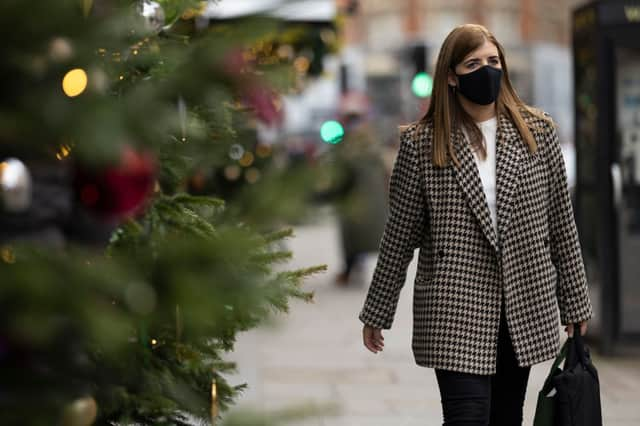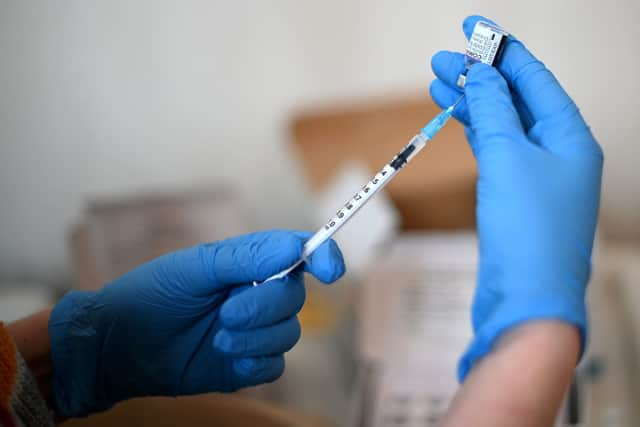UK Omicron Covid cases ‘doubling every three days’ top scientists say
This article contains affiliate links. We may earn a small commission on items purchased through this article, but that does not affect our editorial judgement.


Cases of the new Omicron Covid variant are doubling every three days, an influential scientist has warned.
Experts now believe Omicron could become the UK’s dominant strain in “weeks rather than months”.
Advertisement
Hide AdAdvertisement
Hide AdOn Monday (6 December), Health Secretary Sajid Javid confirmed community transmission of the coronavirus strain was taking place.
As of this morning, the Government has required travellers coming into the UK to provide a negative test result.
What is the latest on the Omicron Covid variant?
In a report by The Times, Professor Neil Ferguson of Imperial College, who sits on the Government’s New and Emerging Respiratory Virus Threats Advisory Group (Nervtag) said early measurements of Omicron Covid-19 cases “suggest a doubling time of three days or less”.
The newspaper said scientists at the UK Health Security Agency had reached a similar conclusion after data showed the number of suspected Omicron cases more than doubled in the final week of November.
Advertisement
Hide AdAdvertisement
Hide AdThe UKHSA has projected that should Omicron continue spreading at its current rate, there could be between 80,000 to 90,000 UK cases per day by the end of December - almost double the current amount.


Yesterday, Sajid Javid said: “The Omicron variant is continuing to spread here and around the world.
“According to the latest data there are now 261 confirmed cases in England, 71 in Scotland and four in Wales, bringing the total number of confirmed cases across the UK to 336.
“This includes cases with no links to international travel. So, we can conclude that there is now community transmission across multiple regions of England.”
Advertisement
Hide AdAdvertisement
Hide AdMr Javid added that the Government couldn’t say for certain whether “Omicron has the potential to knock us off our road to recovery,” and insisted the Government was “leaving nothing to chance”.
He said none of the cases identified so far had resulted in hospital admission.
Official cases could be tip of iceberg
Epidemiologist professor Tim Spector said cases could already number in the thousands “because the current testing is missing a lot of [Omicron cases]” and also possibly because the strain was milder and therefore wasn’t presenting classic Covid symptoms in people.
“[Cases are] probably at least 1,000 to 2,000 I would guess at the moment,” he told BBC Breakfast on Tuesday (7 December).
Advertisement
Hide AdAdvertisement
Hide Ad“And we are expecting this to be doubling about every two days at the moment, so if you do your maths – say assumed it’s 1,000 at the moment, and you think it’s going to be doubling every two days, you can see that those numbers are going to be pretty [high] certainly in about 10 days time.”


Professor Spector added that if the early reports on the Omicron variant were found to be the case, i.e. that it does not cause as severe an illness as previous variants but is more transmissible, “it means that perhaps twice as many people are going to pass it on from when someone gets it in a crowd.
“That’s going to be good news for the individual because we have less cases going to hospital, and partly this is due to our high vaccination rates.
“But it also means that eventually you will get more deaths and problems, because nearly everyone is infected or re-infected.
Advertisement
Hide AdAdvertisement
Hide Ad“And so, this means that for the country as a whole, it could be worse news but better for the individual. So it’s absolutely no reason for complacency.”
Meanwhile, Dominic Raab said the Government felt its winter Covid Plan B is not needed “because of the success of the vaccine programme”.
The Deputy Prime Minister told BBC Radio 4’s Today programme: “We’re doing everything that can be done to tackle the risk that we face, and we’re doing it in the proportionate way that doesn’t create other risks and other challenges.”
His comments came despite health bosses and scientists urging the Government to implement tougher Covid restrictions this winter.
Advertisement
Hide AdAdvertisement
Hide AdUK passes grim milestone
The latest news on the Omicron Covid variant comes after the UK passed 170,000 deaths caused by Covid-19 since the pandemic began.
According to the Office for National Statistics [ONS], 171,792 deaths occurred in the UK where Covid-19 was mentioned on the death certificate between 7 March 2020 and 26 November 2021.
Of this number, 44,274 care home residents in England and Wales have had Covid-19 recorded on their death certificate since the pandemic began.
The highest death toll on any single day was 1,485 on 19 January 2021.
Advertisement
Hide AdAdvertisement
Hide AdThe ONS statistics also showed there have been more than 79,000 excess deaths in private homes in England and Wales during this time period.
Of this number, only 9,180 – 12% – were deaths involving Covid-19.